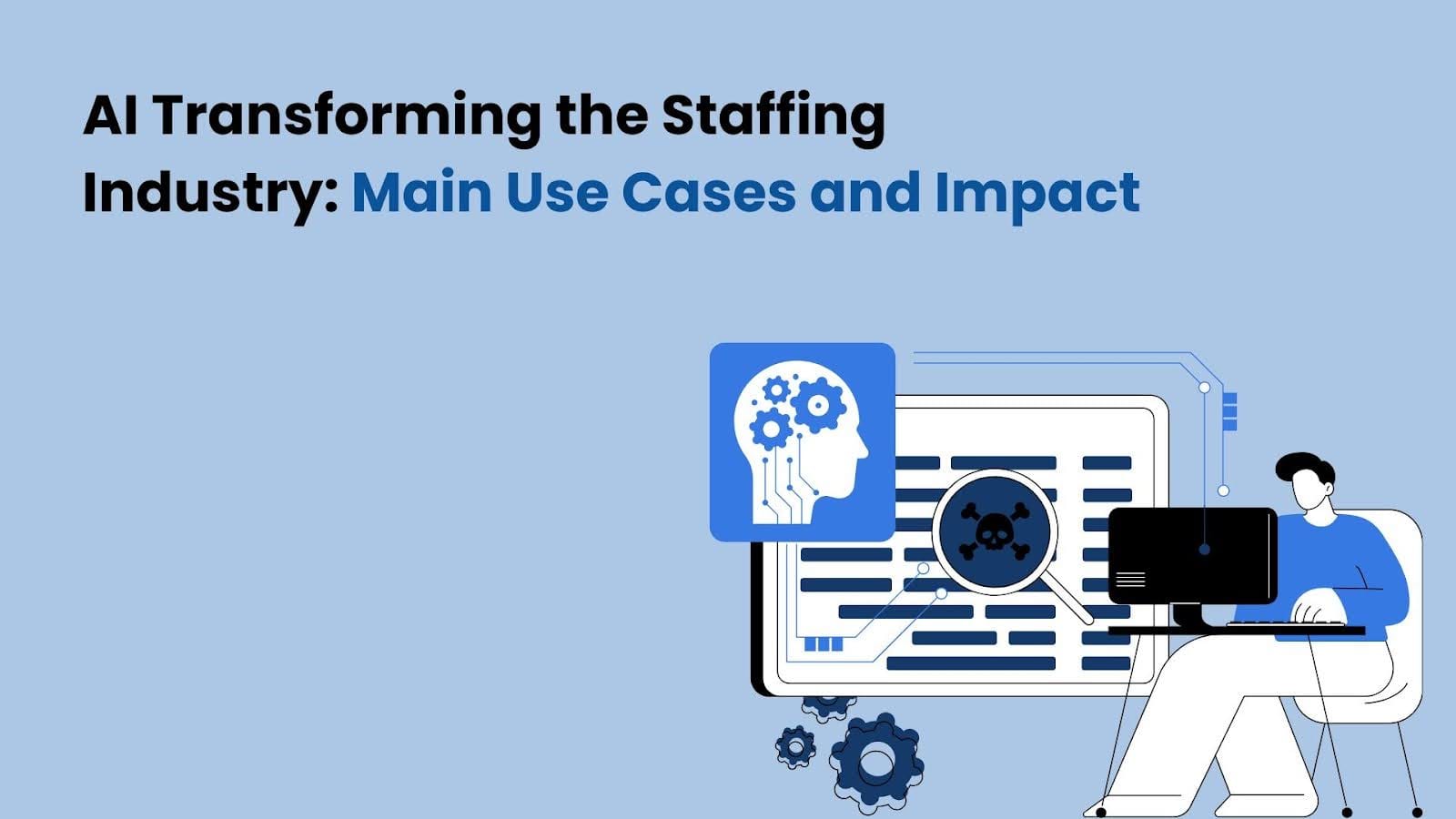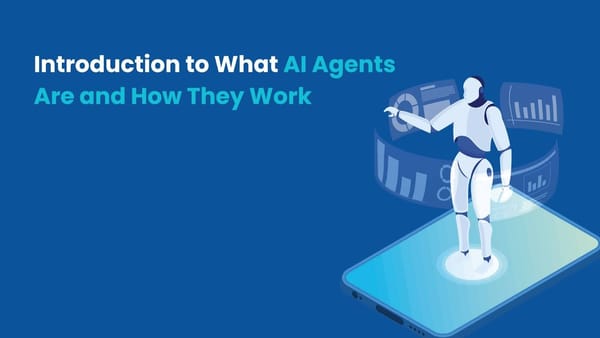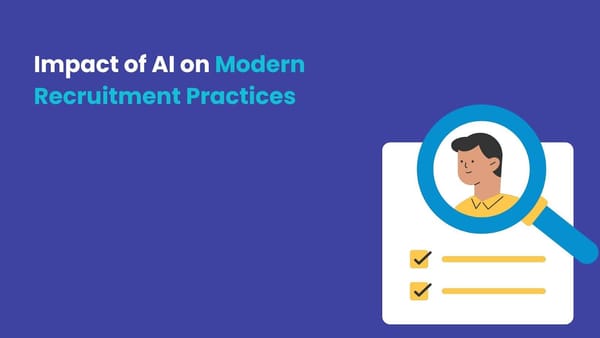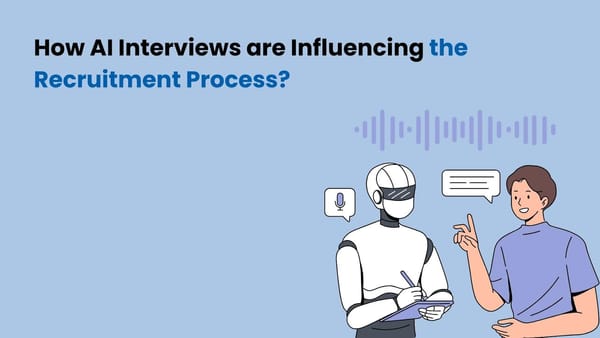Is your hiring process taking too long? Are you struggling to find the right talent before your competitors do?
Recruitment challenges can slow down business growth, especially for startups and fast-growing companies where speed, efficiency, and cost-effectiveness are non-negotiable. Traditional hiring methods often fail to keep pace with rapid expansion, leading to lost opportunities and increased costs. This is where AI in staffing is making a significant impact, streamlining hiring processes and ensuring businesses secure top talent faster.
From automating candidate screening to enhancing engagement, AI in staffing is more than just a trend—it’s a necessity for companies looking to scale without the hiring headaches. In this blog, you'll discover the key ways AI is transforming recruitment, how it addresses the biggest hiring pain points, and why leveraging this technology can give your business the competitive edge it needs.
Traditional hiring struggles to keep up. AI isn’t just an upgrade—it’s a game-changer, reshaping how businesses find and secure talent.
Understanding AI in Recruitment and Staffing
Recruitment has always been a time-consuming process—posting jobs, screening resumes, scheduling interviews, and ensuring the right match. However, AI is transforming these tedious tasks into an efficient, data-driven approach, helping businesses hire smarter and faster.
At its core, AI in staffing uses machine learning and automation to analyze resumes, predict candidate success, and even conduct initial interviews. Instead of relying on manual screening, AI quickly sifts through thousands of applications, identifying top talent based on predefined criteria.
For example, imagine a Dubai-based tech startup looking to hire a software engineer. The hiring manager, Omar, posts a job listing and receives over 500 applications within days. Reviewing each manually would take weeks, delaying critical product development.
By implementing AI-powered recruitment tools, the company can automatically filter out unqualified applicants, analyze skills using natural language processing (NLP), and even conduct AI-driven video interviews. Within hours, Omar receives a shortlist of the top 10 candidates, ready for final interviews.
The result? A streamlined hiring process that ensures the company secures the best talent before competitors do.
The Growth of AI in Staffing: The demand for AI-driven hiring is skyrocketing. The global artificial intelligence in HR market is projected to grow from USD 8.16 billion in 2025 to approximately USD 30.77 billion by 2034, expanding at a CAGR of 15.94%. This surge highlights how businesses are rapidly adopting AI to enhance recruitment efficiency and gain a competitive edge.
Let’s understand the difference between AI in staffing and traditional staffing in detail:
Sorting resumes manually is outdated. AI filters, ranks, and shortlists top talent instantly, ensuring recruiters never miss the right fit.
Smarter Candidate Screening with AI
As you can see, traditional hiring methods often lead to inefficiencies, delays, and even overlook great talent due to human biases or resume overload. So, here’s how AI is changing this by making candidate screening faster, smarter, and fairer:
1. AI-Driven Resume Analysis and Skill Assessment
How much time does your team spend manually sorting resumes? Probably too much. AI-powered tools can instantly scan thousands of applications, analyzing skills, experience, and even writing style to match the best candidates to a job.
For instance, AI-backed Applicant Tracking Systems (ATS) don’t just look for keywords—they understand context, evaluating candidates based on actual job requirements. This means no more filtering out top talent just because they didn’t use the "right" buzzwords.
2. AI-Enhanced Technical Evaluations and Interview Insights
Resumes only tell part of the story. How do you assess whether someone can actually do the job? AI-driven assessments take this a step further by offering automated coding tests, AI-based case studies, and even virtual interview analysis.
For example, if you’re hiring a software developer, AI can analyze their coding logic, efficiency, and problem-solving skills in real time. Instead of relying on self-reported skills, hiring managers get data-backed proof of a candidate’s actual expertise.
Beyond hard skills, AI-powered video interview tools assess facial expressions, speech patterns, and response quality to provide deeper insights into a candidate’s confidence and cultural fit.
3. Eliminating Hiring Bias with AI-Driven Shortlisting
Bias—whether conscious or unconscious—often creeps into recruitment. Hiring managers might lean towards certain candidates based on background, education, or even just a "gut feeling." AI removes this subjectivity by focusing purely on skills, experience, and data.
For example, instead of favoring candidates from top-tier universities, AI evaluates actual performance indicators, ensuring businesses don’t miss out on high-potential talent just because of a non-traditional background.
Great hires aren’t just about skills—candidate experience matters. AI makes hiring seamless, engaging, and personalized from the first interaction.
Enhancing Candidate Experience with AI
In the UAE’s competitive job market, hiring isn’t just about selecting candidates—it’s about attracting them. A poor recruitment experience drives talent away, making engagement crucial. AI is changing this by making interactions faster, more personalized, and more responsive.
]With the AI market in UAE set to reach $1.26 billion in 2025 and grow to $4.28 billion by 2030, businesses must embrace AI-driven hiring to stay ahead.
Let’s explore how AI is transforming recruitment into a smarter, candidate-first experience.
1. Real-Time Personalized Outreach and Engagement
Ever lost a great candidate because they didn’t hear back soon enough? Slow responses can cost you top talent. AI ensures instant engagement by analyzing candidate profiles and sending personalized outreach messages—tailored to their skills, interests, and job preferences.
For instance, an AI-driven hiring assistant can send follow-ups like:"Hey Sara, we noticed your experience in digital marketing aligns with our latest opening. Would you like to schedule a quick chat?"
This proactive approach makes candidates feel valued and increases their likelihood of responding.
2. Smart Chatbots for Seamless Candidate Interaction
AI-powered chatbots do more than just send automated responses. They answer FAQs, provide interview tips, and guide candidates through the hiring process—24/7.
Imagine a candidate is unsure about the next steps after applying. Instead of waiting for a recruiter’s email, an AI chatbot can immediately respond:"Thanks for applying! Your profile is under review, and we’ll update you within 48 hours. Meanwhile, here are some insights on what to expect in the interview process."
This real-time support creates a smoother, frustration-free hiring experience.
3. AI-Powered Social Media Integration for Talent Acquisition
Today’s top candidates aren’t just active job seekers—many are passive. They might not be looking for a job, but if the right opportunity appears on their social feed, they might consider it. AI helps recruiters identify and engage with potential talent on platforms like LinkedIn, Twitter, and even niche communities.
For example, AI can analyze social media activity to predict job-switching behaviors—spotting patterns like increased LinkedIn activity or new certifications. Recruiters can then target these candidates with personalized job offers, reaching them before they even start looking.
Beyond engagement, AI streamlines the hiring workflow, eliminating manual tasks so recruiters can focus on strategy, not paperwork.
AI for Efficient Hiring Operations
From scheduling interviews to ensuring compliance, these repetitive activities take up valuable time that recruiters could spend on more strategic work. This is where AI steps in, streamlining operations and eliminating inefficiencies.
1. Automating Administrative Processes
How much time does your team spend on routine tasks like intake calls, compliance checks, and data entry? Probably more than you'd like. AI-powered systems can handle these tasks effortlessly, ensuring a faster and error-free process.
For example, AI-driven recruitment software can automatically:
- Verify candidate credentials instantly, reducing manual background checks.
- Automate onboarding paperwork, ensuring faster integration of new hires.
- Flag missing information and ensure compliance with local hiring regulations in the UAE.
By cutting down administrative workload, AI frees up recruiters to focus on what truly matters—hiring top talent.
2. AI-Driven Interview Scheduling and Communication
Ever played email tag with a candidate just to set up an interview? It’s frustrating and inefficient. AI-powered scheduling tools eliminate this hassle by coordinating availability between recruiters and candidates in real time.
Imagine this: A top-tier candidate is considering multiple job offers. If your team takes too long to schedule an interview, you might lose them to a competitor. AI-powered tools instantly match availability, sending automatic invites and confirmations—ensuring interviews happen faster.
Beyond scheduling, AI-driven communication tools can:
- Send timely updates and reminders to candidates.
- Automatically respond to FAQs, reducing recruiter workload.
- Maintain engagement, preventing drop-offs during the hiring process.
A smooth hiring experience keeps candidates excited about the opportunity, rather than frustrated by delays.
3. Fraud Detection and Payroll Error Prevention
Hiring in high-growth companies means managing payroll, compliance, and identity verification—all of which are prone to human error or fraud. AI helps prevent costly mistakes by detecting red flags before they become problems.
For instance, AI-powered fraud detection tools can:
- Spot inconsistencies in employment history or credentials.
- Detect payroll anomalies, preventing overpayments or fraudulent salary claims.
- Ensure adherence to UAE labor laws, reducing compliance risks.
By catching issues before they escalate, AI safeguards businesses from financial losses and legal troubles—ensuring hiring operations run smoothly.
Hiring should be proactive, not reactive. AI analyzes trends, predicts staffing needs, and ensures businesses hire smarter, not harder.
Data-Driven Staffing Decisions with AI
The best hiring decisions are based on data, not guesswork. AI-driven analytics give companies a competitive edge by predicting hiring needs, tracking talent availability, and optimizing workforce planning.
1. AI-Driven Market Trend Analysis for Hiring Forecasts
Ever wondered which job roles will be in demand six months from now? AI can analyze market trends to help businesses stay ahead of hiring needs.
For example, AI-driven workforce analytics can:
- Identify rising job market trends based on industry demands.
- Predict salary expectations, helping companies budget better.
- Track competitor hiring patterns, allowing businesses to adjust their recruitment strategy accordingly.
Rather than reacting to sudden hiring needs, AI helps proactively plan for future staffing demands—ensuring companies never fall behind.
2. Predictive Analytics for Staffing Demand and Candidate Availability
What if you could predict when your next hiring crunch will happen? AI makes this possible by analyzing:
- Seasonal hiring trends
- Employee turnover patterns
- Candidate availability in specific industries
For instance, AI can forecast that finance professionals will be in high demand after Q1 due to tax season. This allows companies to begin talent acquisition efforts earlier, reducing last-minute hiring stress.
With AI, businesses make informed staffing decisions rather than relying on gut feelings.
3. AI-Powered Pipeline Building to Match Candidates with Job Openings
Hiring should never be a last-minute scramble. AI ensures companies always have a talent pipeline ready by continuously identifying potential candidates—even if they aren’t actively looking.
How does it work?
- AI scans internal databases to find past applicants who are now a better fit.
- It tracks passive candidates based on industry movements and skill upgrades.
- It predicts which candidates might be open to new opportunities based on career patterns.
Instead of starting the recruitment process from scratch each time, AI ensures businesses always have a pool of qualified talent to tap into.
With AI taking the lead, ethical concerns arise. Can automation be fair, unbiased, and transparent? Human oversight remains essential.
Ethical Considerations and Challenges in AI Recruitment
AI in staffing offers undeniable advantages, but what happens when technology starts making hiring decisions without human oversight? While AI promises efficiency, it also comes with risks. Let's explore them in detail.
1. Bias in AI: Can Algorithms Truly Be Neutral?
AI is designed to streamline hiring, but can it truly be fair? AI learns from past hiring data, and if that data includes biases, the system may unknowingly reinforce them. This means certain candidates—based on gender, ethnicity, or educational background—could be overlooked simply because past hiring patterns favored others. Instead of solving bias, AI might amplify it unless businesses actively intervene.
The key to fair hiring isn’t just using AI—it’s training it with diverse datasets and constantly auditing its decisions. AI should improve diversity, not limit it. Without human oversight, companies risk creating an automated hiring system that excludes, rather than includes, top talent.
2. AI Transparency: Are Hiring Decisions Explainable?
If a candidate is rejected, can you explain why? Many AI hiring tools operate as black boxes, meaning recruiters may not fully understand how decisions are made. A system might reject a highly skilled applicant, but without transparency, recruiters can’t challenge or refine its reasoning. Lack of explainability can erode trust in AI-driven hiring, both internally and externally.
Businesses must ensure AI tools provide clear insights into why certain candidates are shortlisted or filtered out. AI should offer data-driven support, but final hiring decisions should remain in the hands of human recruiters who can assess soft skills, leadership potential, and cultural fit—factors that no algorithm can fully measure.
3. Regulatory Compliance: Is AI Legally Sound?
AI-driven hiring must align with labor laws and anti-discrimination regulations—or companies risk legal trouble. In the UAE and globally, AI compliance standards are evolving, and businesses using automated recruitment tools must stay ahead of new regulations.
Hiring decisions influenced by AI should be fair, unbiased, and legally defendable. If a company cannot justify why a candidate was rejected, it may face litigation, penalties, or even bans on AI-driven recruitment tools.
To stay compliant, organizations must ensure that AI hiring solutions are ethically trained, regularly audited, and fully transparent. AI should make hiring more accountable, not legally questionable.
AI is evolving fast, but its success depends on balance. The future of hiring blends technology with human intuition and judgment.
The Future of AI in Staffing
AI is no longer a futuristic concept—it’s already reshaping the hiring industry, and companies that fail to adapt risk falling behind. Here’s how AI is supporting intelligent decision-making that enhances every stage of hiring.
1. Predictive Hiring: Forecasting Talent Needs Before They Arise
AI is shifting recruitment from a reactive process to a proactive strategy. Instead of waiting for positions to open, AI-driven systems can predict hiring needs months in advance. By analyzing industry trends, company growth patterns, and employee turnover rates, businesses can anticipate which roles will need to be filled and prepare accordingly.
This means companies can start sourcing candidates before demand peaks, reducing hiring delays and ensuring continuity. The ability to forecast talent needs gives businesses an edge over competitors, preventing last-minute hiring scrambles and securing top talent before they even enter the job market.
2. AI-Enhanced Candidate Engagement: Beyond Basic Automation
AI is no longer just a filtering tool—it’s transforming how businesses interact with candidates. The next generation of AI in staffing focuses on hyper-personalized engagement, offering job seekers real-time career insights, interview tips, and customized job recommendations based on their skills and interests.
Instead of treating candidates as one-time applicants, AI helps companies build long-term relationships, keeping potential hires engaged even when no immediate openings exist. The future of recruitment isn’t just about filling roles—it’s about creating a talent network where candidates feel valued before they even apply.
3. The Human-AI Balance: Why Recruiters Are Still Essential
Will AI ever replace recruiters? Absolutely not. AI can analyze data at scale, but it cannot assess human potential, ambition, or adaptability—qualities that define top talent. An AI might rank candidates based on experience, but it cannot determine who will grow into a leadership role or drive company culture forward.
The most effective hiring strategies will be those that combine AI’s efficiency with human judgment. AI should handle repetitive tasks, freeing recruiters to focus on relationship-building, mentorship, and strategic decision-making. The future of staffing is not AI versus humans—it’s AI empowering recruiters to make better, faster, and more informed hiring decisions.
AI in staffing isn’t just theory—TidyHire is making it a reality, delivering smarter, faster, and more effective recruitment solutions.
TidyHire: The AI-Powered Solution Transforming the Staffing Industry
Hiring the right people has never been more challenging. With talent shortages, slow recruitment processes, and fierce competition, businesses need a smarter way to connect with top candidates—before someone else does. That’s exactly what TidyHire delivers.
TidyHire helps recruiters find, engage, and hire the best talent faster by automating the most time-consuming parts of outbound hiring. No more endless searching, ignored emails, or clunky hiring processes. Just a smarter way to recruit—backed by AI, but powered by real, human-driven results.
1. Find the Right Talent Without the Guesswork
If you’re still spending hours manually searching for candidates, it’s time for an upgrade. TidyHire’s Recruiting Intelligence Agent (RIA) taps into over 700 million profiles from 30+ sources, giving recruiters access to pre-verified candidates instantly. Instead of chasing outdated leads, you get high-quality talent, complete with verified contact details, delivered straight to your workflow.
2. Personalized Outreach That Actually Gets Responses
Reaching out to candidates is easy. Getting them to respond? That’s the hard part. TidyHire makes outreach personal, not robotic, crafting messages that actually resonate with candidates based on their skills, career interests, and industry trends.
Whether through LinkedIn, email, SMS, or WhatsApp, recruiters can connect with people where they prefer to communicate—not just where it’s convenient for the company. Better engagement means better hires, faster.
3. All Your Hiring Tools, Working Together
Juggling multiple platforms slows everything down. TidyHire integrates smoothly with Slack, Microsoft Teams, and ATS platforms, keeping everything in sync so recruiters can focus on hiring—not jumping between apps.
With the TidyHire Chrome Extension, sourcing candidates from professional networks is seamless, with instant access to verified contact details. No copy-pasting, no manual data entry—just smooth, efficient hiring.
4. Know What’s Working (and What’s Not) with Real-Time Insights
Recruitment isn’t just about effort—it’s about doing more of what works. TidyHire’s dashboard tracks candidate engagement, response rates, and hiring trends in real time, helping recruiters fine-tune their strategy. With daily reports, hiring teams know exactly where to focus their efforts, eliminating wasted time and improving hiring success. No more guesswork—just data-backed decisions that get results.
5. Scale Without the Growing Pains
Whether you're hiring for a few key roles or managing large-scale recruitment, TidyHire grows with you. The platform handles high-volume hiring with ease, ensuring recruiters aren’t stuck doing repetitive tasks when they should be focusing on building relationships and making smart hiring decisions.
Need extra support? TidyHire’s Xceptional Recruiters work alongside AI to source, engage, and secure top talent—helping businesses scale without sacrificing quality.
Conclusion
The best candidates don’t wait for job postings—they get recruited. TidyHire helps businesses stay ahead by sourcing top talent, personalizing outreach, and simplifying the hiring process from start to finish. AI does the heavy lifting, but human recruiters stay in control, making better hiring decisions, faster.
If you’re ready to hire smarter, not harder—Book a demo with TidyHire today!






